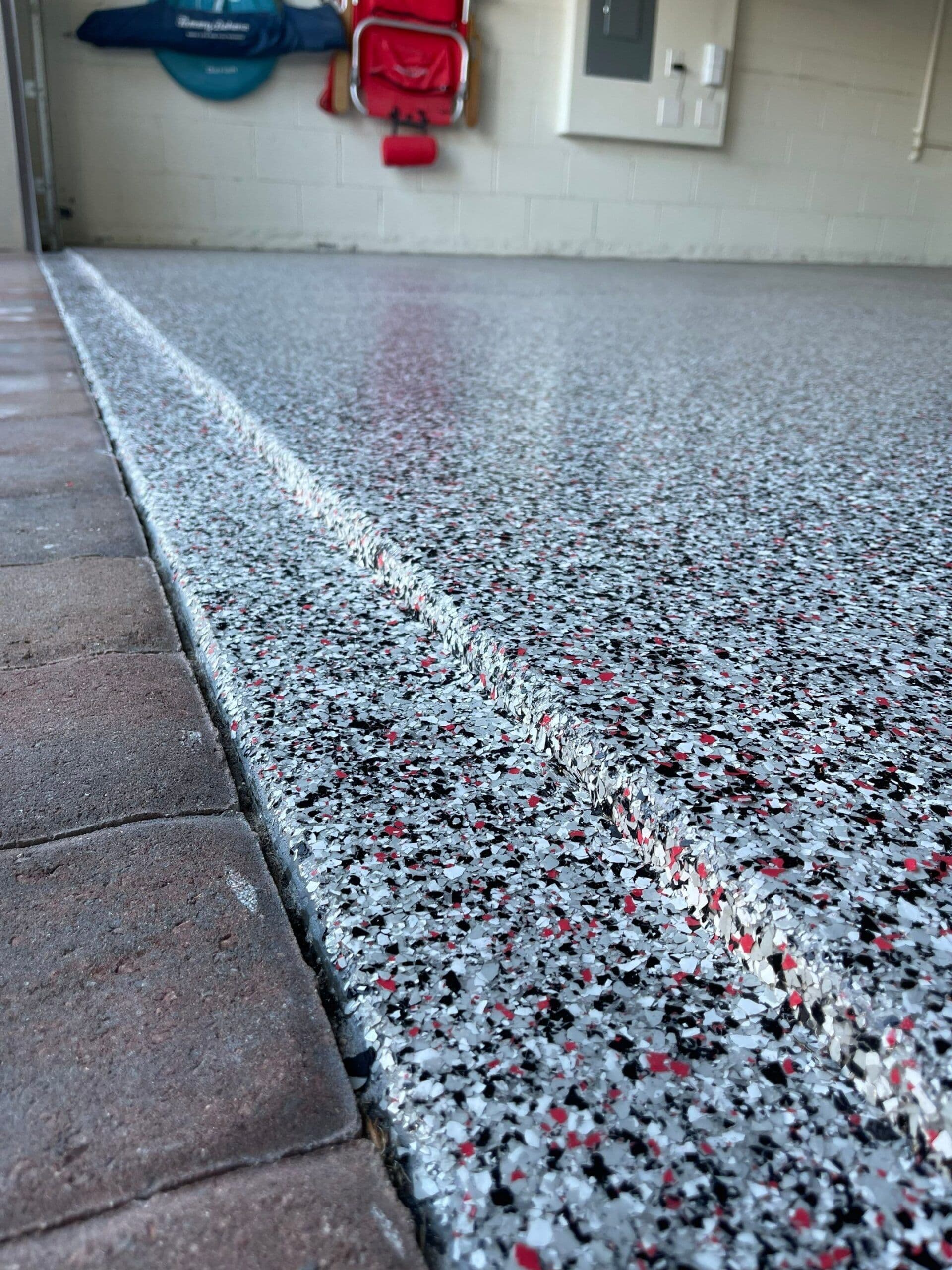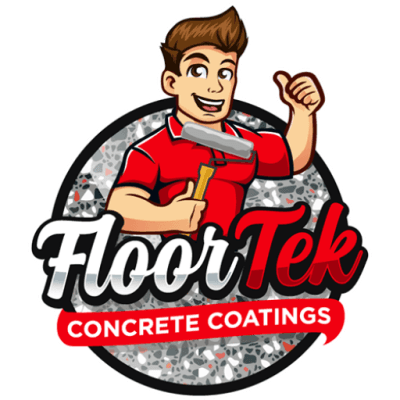Polyaspartic vs. Polyurea:
The Homeowner's Guide to Upgrading from Epoxy
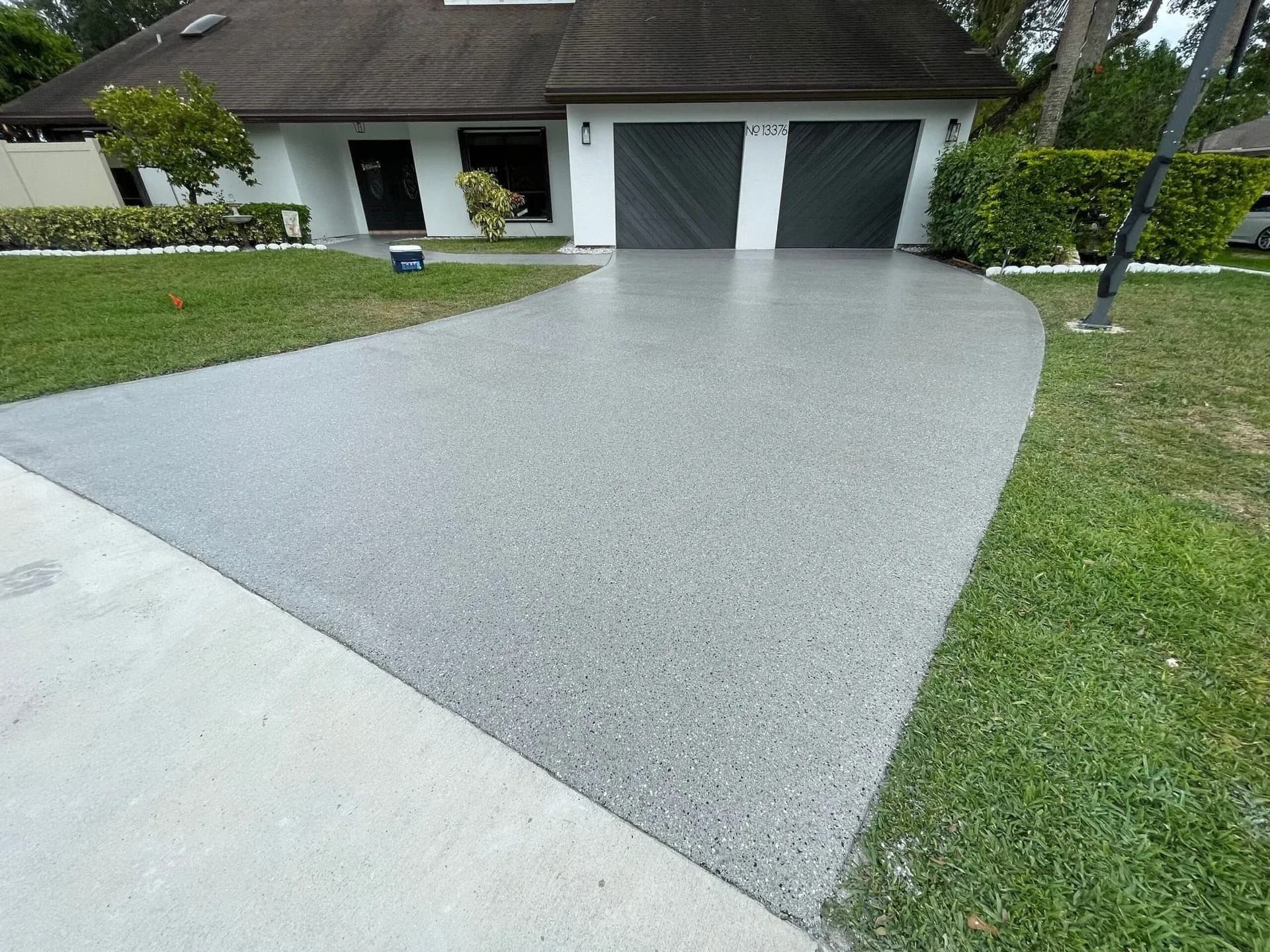
If you're exploring the world of polyaspartic vs polyurea coatings, you're already on the right path. You’ve probably gazed at your stained, dusty, or cracked concrete garage floor and thought, "There has to be something better than this."
Perhaps you've even had the unfortunate experience of an epoxy floor that chipped, yellowed, and peeled up under your hot tires. We understand the frustration and the need for a permanent solution.
We get it. At Floortek Coatings We have spent years repairing failed epoxy floors across the United States. The good news is that coating technology has advanced significantly. The debate between polyaspartic and polyurea is a worthwhile one, as both of these "next-generation" coatings operate in a completely different league. Frankly, they are 10X better than epoxy.
In this guide, we'll break down the polyaspartic vs polyurea discussion in simple, layperson's terms. We’ll explain what they are, how they differ, and what we use to create our signature 1-day floor coatings. We’re here to help you make the right choice for your home.
And to make that decision even easier, we're currently offering 30% off on first installation projects.
The Big Problem: Why Your Epoxy Floor Failed
Before we compare these two advanced coatings, let's talk about the 800-pound gorilla in the room: epoxy. For decades, epoxy was the go-to "solution" for garage floors. You can purchase a kit at any big-box hardware store, and numerous painters and handypersons also offer it.
The problem? Epoxy is cheap, and it performs cheaply. It's an outdated technology that wasn't designed for the challenges of a modern garage or outdoor space.
If you've ever had an epoxy floor, this probably sounds familiar:
Hot-Tire Pickup: You drive home on a hot day, park your car, and the next morning, you pull out, taking a chunk of the "coating" with you. The heat from your tires actually re-melts the weak epoxy bond and pulls it right off the concrete.
Yellowing & Fading: Epoxy is not UV stable. This means if your garage gets any sunlight, or if you dare to use it on a patio or driveway, the sun's rays will break it down. It turns a sickly, faded yellow color, often within a single year.
Peeling and Chipping: Epoxy is rigid. It forms a hard, brittle shell. While that sounds strong, it means it has no flexibility. When you drop a heavy tool or the concrete underneath shifts with the seasonal temperature changes, it doesn't bend—it cracks and chips.
The 5-Day Wait: A typical epoxy installation takes the better part of a week. You must clean the floor, etch it, apply a coat, wait 24 hours, apply another coat, and then wait an additional 3-5 days before walking on it or parking your car. It's a massive disruption.
This is why so many homeowners end up in a frustrating cycle of searching for epoxy garage floor vs polyaspartic or polyaspartic vs epoxy garage floor coating vs epoxy. But rest assured, there is a solution that actually works, and we're here to guide you towards it.
When you see the stark difference between polyaspartic vs epoxy floor coating, you'll understand why professionals like us have moved on. The choice in the epoxy vs polyaspartic garage floor debate is clear. The question isn't whether polyaspartic is better than epoxy (it is, by a mile), but rather which of the new technologies is right for you. And with our expertise and guidance, you can be confident in making the right choice.
Understanding the "Next-Gen" Coatings
To understand the choice between polyaspartic and polyurea, let's first know what they are. Both are part of a high-performance family of coatings called polyurethanes. Think of them as cousins, but with very different characteristics.
What is Polyurea?
Polyurea is the "industrial-strength" cousin. This stuff is incredible. It was initially developed for heavy-duty, extreme applications. Think spray-on truck bed liners, containment walls, or industrial pipes.
Its defining feature is its unbelievably fast cure time.
When we say fast, we mean seconds. A pure polyurea coating is mixed in a special, high-pressure, heated spray rig, and it can be rock-solid in less than 30 seconds after it hits the surface.
The Good:
It creates a nearly indestructible, flexible membrane.
It has incredible chemical resistance.
It can be applied in a vast range of temperatures, even below freezing.
The Bad (for floors):
It cures too fast. You can't roll it on. By the time you poured a puddle on the floor and grabbed a roller, it would already be hard.
This "too-fast" cure time means it doesn't have enough time to soak in properly and bond with the concrete, which can be a problem.
It requires massive, expensive spray equipment, making it impractical for most residential garage floors, patios, or basements.
So, while polyurea is fantastic, its pure form isn't the right fit for a decorative, hand-applied garage floor.
What is Polyaspartic?
This is where science got clever. A "polyaspartic" is technically a type of polyurea. It's a polyurea that has been chemically modified to solve the cure-time problem.
Think of it this way: chemists took the industrial strength of polyurea and engineered it to be user-friendly for floor coatings.
They slowed down the chemical reaction. Instead of curing in 30 seconds, a polyaspartic coating gives us a "pot life" (working time) of 20-30 minutes.
This changes everything.
This working time is the key to success. It’s long enough for our expert installers to pour, squeegee, and back-roll the material by hand, ensuring it applies evenly and creates a perfect, glass-like finish. It also gives the coating time to "wet" the concrete, diving deep into the pores (which we open up with diamond grinding) to create a permanent, molecular bond.
This bond is so strong that it will never, ever peel from hot-tire pickup.
The Good:
100% UV Stable: Unlike epoxy (and some types of polyurea), a polyaspartic coating is aliphatic. In simple terms, this means the sun's UV rays can't break it down. It will never turn yellow or fade, even in the bright summer sun on a pool deck or driveway.
Extreme Durability: It retains the flexibility of polyurea, so it won't chip or crack when dropped from a hammer.
Chemical Resistant: Oil, gas, road salt, fertilizer... nothing bothers it. Could you wipe it clean?
Fast Cure (But Not Too Fast): This is what makes our 1-day floor coatings possible. We can apply a complete system, and you can walk on it in just a few hours, and park your car on it the very next day.
When comparing polyaspartic vs. epoxy costs, you'll find that epoxy kits are generally cheaper upfront. But when that epoxy floor fails in 1-2 years and you have to pay to have it ground off and replaced, you'll see that a polyaspartic system is the more cost-effective choice. It’s a one-and-done, permanent solution.
Polyaspartic vs. Polyurea: A Deeper Dive
So, if polyaspartic is just a modified polyurea, what's the honest debate? It ultimately depends on how the terms are used by different companies and in various products.
As we discussed, a pure polyurea is almost always applied by spray and is typically used in industrial settings. A pure polyaspartic is almost always hand-applied and used for decorative floors.
However, here at Floortek, we've developed a system that doesn't force you to make a choice. We use both.
The Floortek Secret: A Hybrid System for the Perfect Floor
When you search for polyaspartic vs polyurea, you’re missing the real secret. The best floor isn't one or the other—it's a hybrid system that uses the best qualities of both materials.
This is what sets our Coating Products Apart, and represents our years of experience. A "1-Day Floor" from us is a multi-layer system, and each layer does a different job.
Layer 1: The Polyurea Base Coat
After we prepare your floor by diamond grinding the concrete (a step epoxy kits often skip), we apply our base coat. This coat is a 100% solids, fast-curing polyurea.
Why? Because its fast cure and powerful bonding properties allow it to penetrate deeply into the concrete's pores and bond with incredible strength. This layer creates the unbreakable foundation. We then broadcast your choice of decorative vinyl flakes into this wet layer until it’s fully covered.
Layer 2: The Polyaspartic Topcoat
This is the layer you see and walk on. Once the base coat is set (which happens very quickly), we scrape off the excess flakes and apply our clear topcoat. This layer is a 100% solids polyaspartic.
Why? Because this is where UV stability and stain resistance matter most. The polyaspartic topcoat seals everything in, provides a beautiful gloss, and creates a non-porous surface that is easy to clean and will never yellow.
This hybrid approach gives you the best of both worlds. You get the industrial-strength bonding of a polyurea base with the beautiful, UV-stable, and workable finish of a polyaspartic topcoat. This is the ultimate answer to the polyaspartic polyurea vs epoxy floor dilemma.
Safety and Fumes (VOCs)
Another primary concern for homeowners is safety and smell. Old epoxy systems are notorious for their high VOC (Volatile Organic Compound) content. VOCs are chemicals that get released into the air and can be harmful to breathe. According to the U.S. Environmental Protection Agency, VOCs can cause a variety of health effects. (External Link: EPA.gov on Volatile Organic Compounds).
This is another area where our system shines. Both our polyurea and polyaspartic coatings are "100% solids." In simple terms, this means they contain little to no solvents. They have ultra-low or zero VOCs.
While there is a slight smell during application (often compared to new paint), it's not the harsh, lingering chemical odor of epoxy, and it disappears very quickly as the system cures. It's a much safer product for your home and family.
Where Can You Use a Floortek Coating?
Because our hybrid system is so durable, flexible, and UV-stable, it's not just for garages. We’ve installed permanent solutions for homeowners across the US, upgrading various spaces.
Garage Floors: This is the most popular, and for good reason. It turns your garage into a clean, bright, and functional extension of your home. It resolves the epoxy garage floor vs. polyaspartic question once and for all.
Patios: As a patio coating service We're passionate about this. An epoxy-coated patio would likely turn into a yellow, peeling disaster within months. Our polyaspartic topcoat ensures your patio will look brand new, year after year, regardless of the amount of sun it receives.
Pool Decks: Our pool deck coating service Provides a beautiful, textured, and durable surface that withstands pool chemicals and constant exposure to the sun.
Driveways: Your driveway is the first impression your home makes on visitors. Our driveway coating service Provides instant curb appeal that resists road salt, oil leaks, and the elements.
Basements: Looking to finish your basement? Our Basement coating service It is a perfect choice. It's clean, bright, and easy to maintain.
Sidewalks: Prevent your walkways from cracking and staining. Our sidewalk coating service Keeps them looking sharp.
The best part is the customization. This isn't just a grey-painted floor. You can choose from hundreds of combinations of our Colors and Flake Options To perfectly match your home's style.
Our Promise: The Floortek Experience
We understand that a floor coating is a significant investment, and we're committed to getting it right. It's not just about the superior materials we use; it's about the entire process.
When you read our About On our page, you’ll see that we are a team of professionals dedicated to one thing: providing a permanent flooring solution. We don’t cut corners. We own the best diamond-grinding equipment, we are certified in these advanced materials, and we back up our work.
We're so confident in our hybrid system that we offer a Life-of-home warranty on every residential installation. That's not a 5-year pro-rated warranty like you get with epoxy. It's a promise that your floor will not fail for the life of your home.
But don't just take our word for it. We invite you to look at our Gallery Of past projects. You can see hundreds of real-world examples of our work—garages, patios, and basements that have been permanently transformed in just one day.
This is the Floortek difference.
Your Questions Answered: FAQs on Polyaspartic vs. Polyurea
We receive numerous questions about this topic. Here are the 10 most common ones, answered simply for you.
1. What is the main difference between polyaspartic and polyurea?
The main difference is cure time. Polyurea is an industrial coating that cures in seconds. At the same time,e polyaspartic is a type of polyurea modified to cure slower (in minutes/hours), making it perfect for hand-applied, decorative floors.
2. Is polyaspartic better than polyurea?
For a garage floor or patio, yes. A pure polyurea cures too fast for a smooth, decorative finish. A polyaspartic gives a more beautiful, even topcoat while keeping the durability. The best system, however, uses a polyurea base coat and a polyaspartic topcoat.
3. Why is polyaspartic better than epoxy?
Polyaspartic is 10 times better than epoxy because it's 100% UV stable (won't yellow), more flexible (won't chip or peel), has low/no VOCs, and can be installed in just one day, not a week.
4. Will a polyaspartic floor peel from hot tires?
Absolutely not. When professionally installed (with diamond grinding), a polyaspartic/polyurea system forms a molecular bond with the concrete. Hot tires can't peel it off.
5. How long does a polyaspartic floor take to install?
Our hybrid polyurea-polyaspartic system is installed in just one day. You can typically walk on it within 4-6 hours and park your car on it the very next day.
6. Is a polyaspartic floor hard to clean?
It's the easiest floor you will ever clean. Because it's non-porous, nothing can stain it. Oil, dirt, and spills wipe right up with a paper towel or a simple mop.
7. Can polyaspartic coatings be used outside?
Yes! This is one of its most significant advantages over epoxy. Polyaspartic is 100% UV stable, making it the ideal choice for our patio coating and pool deck coating services.
8. What's the verdict on polyaspartic vs epoxy garage floor?
Just to let you know, there is no contest. The polyaspartic vs epoxy garage floor debate is over. Polyaspartic is superior in every single category: durability, UV stability, installation time, and chemical resistance.
9. What is a "hybrid" polyaspartic polyurea vs epoxy floor?
A hybrid system (what Floortek uses) is the best of the best. It utilizes a polyurea base coat for its exceptional bonding strength and a polyaspartic topcoat for its superior UV stability and smooth finish. An epoxy floor is a single-category, brittle, and weak system compared to other flooring systems.
That's the easiest part! Feel free to contact us directly on our website or call us. We'll make sure that we provide a Free Quote with no obligation.
Your Next Step to a Perfect Floor
Stop being frustrated by your old concrete or a failed epoxy job. You've researched on polyaspartic vs polyurea, and you know there's a better solution.
It's time to upgrade your home with a permanent, beautiful, and functional floor from Floortek Coatings. With our 1-day installation, lifetime home warranty, and expert team, you are getting the best value and performance on the market.
For a limited time, we are offering 30% off for first-time installations.
Don't wait another season. Get the last floor you'll ever need.
Call us now for your Free Quote at 844-844-4164 Or fill out our simple form to contacat us today.
FREE In-Home Estimate
Plus 30% Off
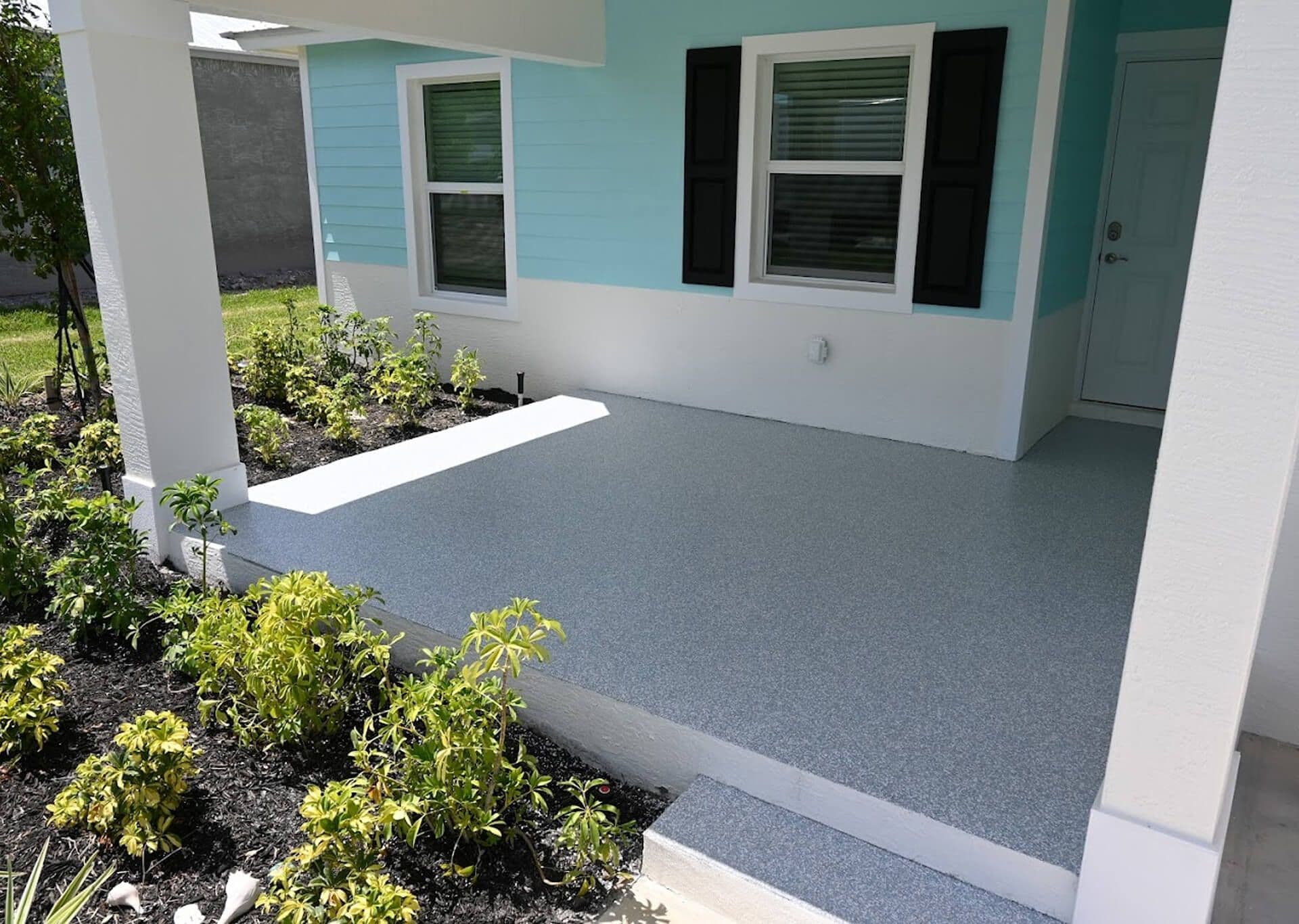
Testimonials
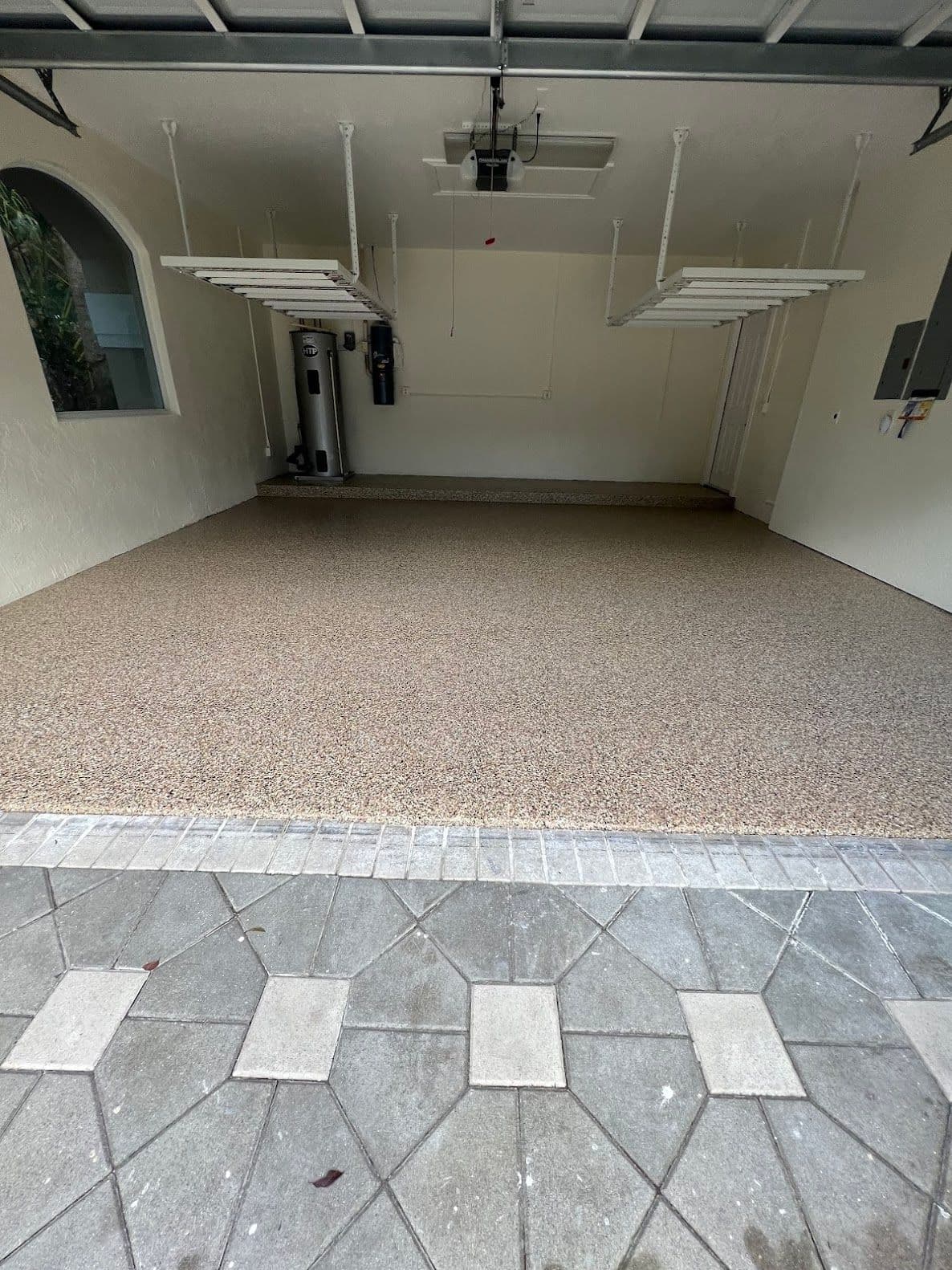
We had both of our garages done and an outdoor concrete platform. The crew was courteous and professional. Everyone from Nancy our salesperson to Patrick, the manager, Logan and his crew were outstanding. Our floors look fantastic and we were very happy we chose this company.
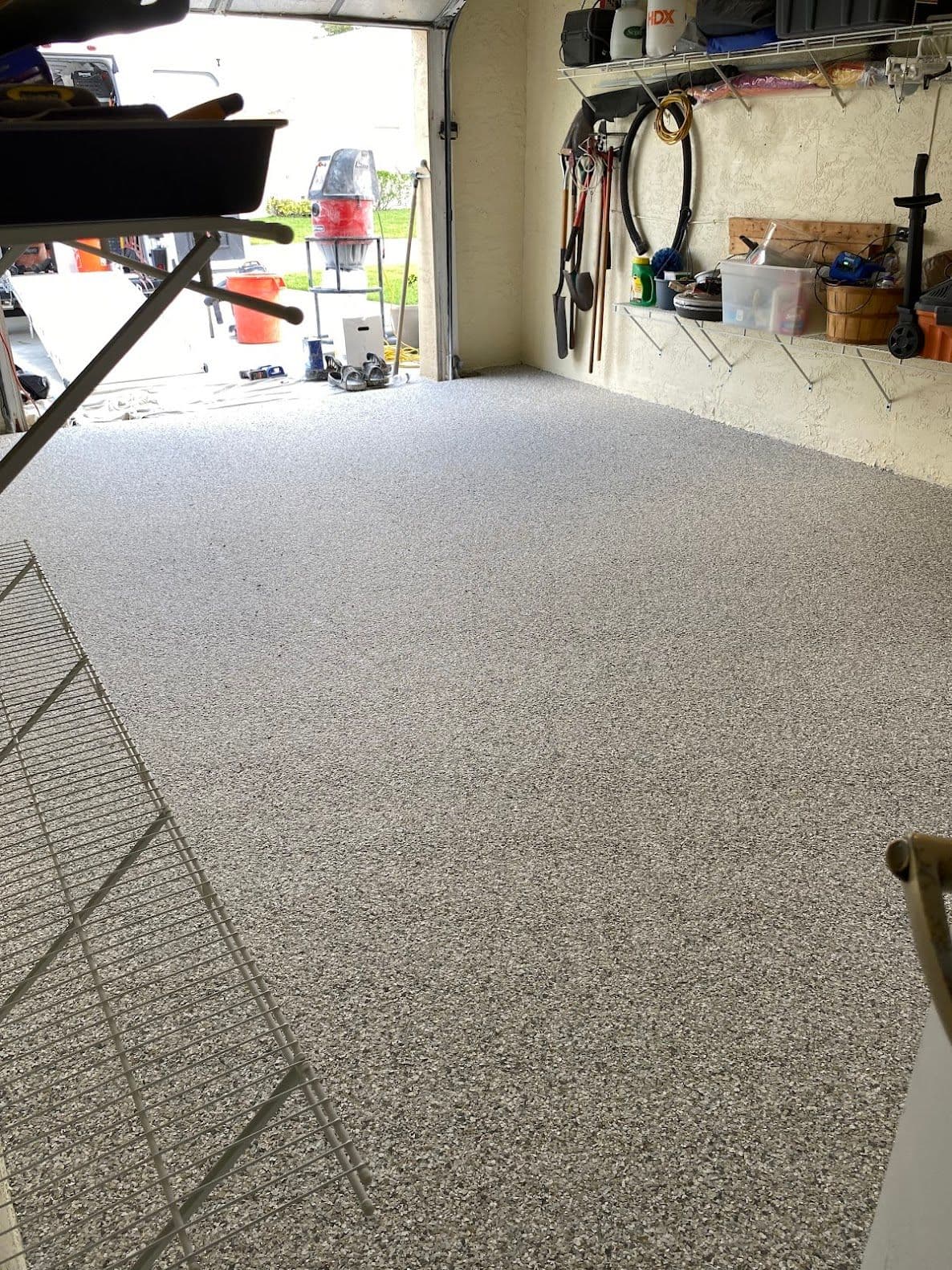
I am very pleased with the quality of work FloorTek has done for me. The two employees that did the actual work were very courteous, worked hard, and explained everything they were doing. Thank you for a great job.
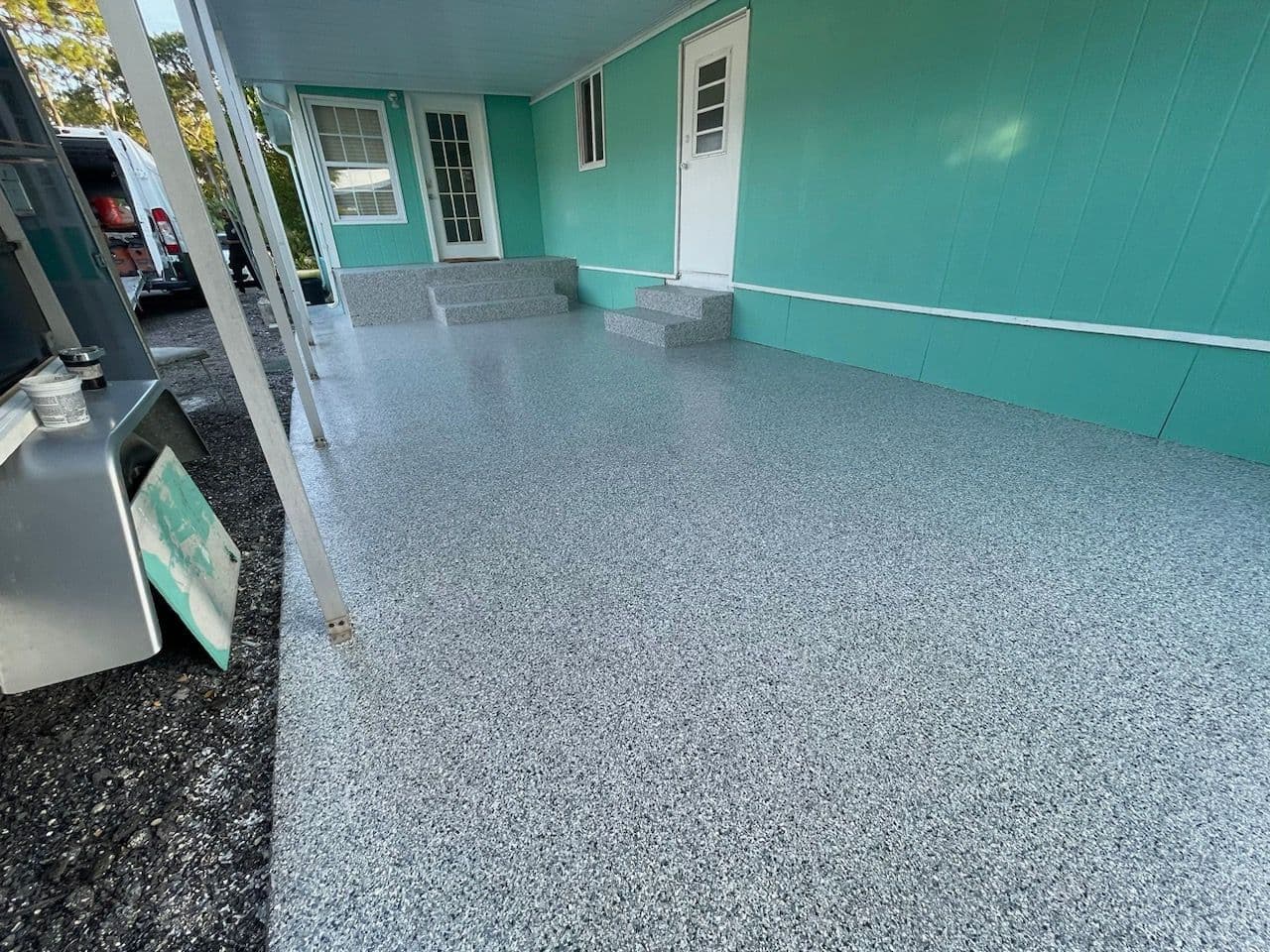
I was happy with the job Floortek did. Good customer communication and customer relationship. My old ugly porch was transformed and I love it. Nancy was very helpful throughout the process. Just know that rain may impact your schedule to make sure the products at highest quality during application.



Contact FloorTek Today
